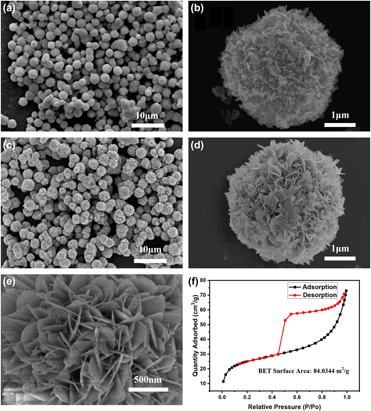Crossref Citations
This article has been cited by the following publications. This list is generated based on data provided by
Crossref.
Ponzoni, Andrea
2020.
Morphological Effects in SnO2 Chemiresistors for Ethanol Detection: A Review in Terms of Central Performances and Outliers.
Sensors,
Vol. 21,
Issue. 1,
p.
29.
Wang, Xiao-jun
Tian, Yu-ming
Wang, Yuan-yang
Hao, Jian-ying
and
Bai, Pin-bo
2020.
The effect of SnO2 additive on the densification, microstructure and mechanical properties of MgAl2O4–CaAl12O19 composites.
Ceramics International,
Vol. 46,
Issue. 11,
p.
17784.
Gao, Liping
Fu, Hao
Zhu, Jiejun
Wang, Junhai
Chen, Yuping
and
Liu, Hongjie
2020.
Synthesis of SnO2 nanoparticles for formaldehyde detection with high sensitivity and good selectivity.
Journal of Materials Research,
Vol. 35,
Issue. 16,
p.
2208.
Gulevich, Dayana
Rumyantseva, Marina
Gerasimov, Evgeny
Khmelevsky, Nikolay
Tsvetkova, Elena
and
Gaskov, Alexander
2020.
Synergy Effect of Au and SiO2 Modification on SnO2 Sensor Properties in VOCs Detection in Humid Air.
Nanomaterials,
Vol. 10,
Issue. 4,
p.
813.
Xu, Lei
Ge, Meiying
Zhang, Fang
Huang, Haijun
Sun, Yan
and
He, Dannong
2020.
Nanostructured of SnO2/NiO composite as a highly selective formaldehyde gas sensor.
Journal of Materials Research,
Vol. 35,
Issue. 22,
p.
3079.
Ponzoni, Andrea
2021.
Morphological Effects in SnO2 Chemiresistors for Ethanol Detection: A Systematic Statistical Analysis of Results Published in the Last 5 Years.
p.
75.
Ivanovskaya, Maria
Ovodok, Evgeni
Gaevskaya, Tatiana
Kotsikau, Dzmitry
Kormosh, Valentina
Bilanych, Vitaliy
and
Micusik, Matej
2021.
Effect of Au nanoparticles on the gas sensitivity of nanosized SnO2.
Materials Chemistry and Physics,
Vol. 258,
Issue. ,
p.
123858.
Maheswari, S.
Karunakaran, M.
Hariprasad, K.
Kasirajan, K.
Chandrasekar, L. Bruno
Alshahrani, T.
Shkir, Mohd.
and
AIFaify, S.
2021.
Enhanced room-temperature ammonia vapor-sensing activity of nebulizer spray pyrolysis fabricated SnO2 thin films: an effect of Er doping.
Journal of Materials Research,
Vol. 36,
Issue. 3,
p.
657.
John, Riya Alice B.
and
Ruban Kumar, A.
2023.
Tuning the p-type conductivity of NiO for the room temperature formaldehyde detection.
Inorganic Chemistry Communications,
Vol. 150,
Issue. ,
p.
110445.
Fu, Qiang
Lu, Kangzhi
Li, Ning
and
Dong, Zhanhua
2023.
Advances in the development of MOS-based sensors for detection of ethanol: A review.
Materials Research Bulletin,
Vol. 168,
Issue. ,
p.
112457.
Hu, Kun
Li, Yuanfan
Ge, Chuanxin
Bai, Ling
Liu, Guiwu
Qiao, Guanjun
Kang, Sung Gu
Kim, Eui Jung
and
Wang, Mingsong
2023.
Room-temperature ppb-level NO2 sensitivity of three-dimensional ordered macroporous Au-loaded SnO2 under intermittent UV light irradiation.
Sensors and Actuators B: Chemical,
Vol. 387,
Issue. ,
p.
133786.
Luan, Sen
Hu, Jinhu
Ma, Mingliang
Tian, Jiale
Liu, Di
Wang, Jianyi
and
Wang, Jin
2023.
The enhanced sensing properties of MOS-based resistive gas sensors by Au functionalization: a review.
Dalton Transactions,
Vol. 52,
Issue. 25,
p.
8503.
Zhu, Li-Yuan
Ou, Lang-Xi
Mao, Li-Wen
Wu, Xue-Yan
Liu, Yi-Ping
and
Lu, Hong-Liang
2023.
Advances in Noble Metal-Decorated Metal Oxide Nanomaterials for Chemiresistive Gas Sensors: Overview.
Nano-Micro Letters,
Vol. 15,
Issue. 1,
Zhang, Yuhong
Wang, Lvqing
Li, Shenghui
Yang, Shengjue
and
Liu, Hang
2024.
Au/ZnO/In2O3 nanoparticles for enhanced isopropanol gas sensing performance.
RSC Advances,
Vol. 14,
Issue. 5,
p.
3044.
Li, Luoyu
Yang, Jie
Zhu, Lifeng
Li, Sipeng
Ma, Chao
Zhao, Yang
Zhang, Yifan
and
Xiao, Song
2024.
The Proceedings of 2023 4th International Symposium on Insulation and Discharge Computation for Power Equipment (IDCOMPU2023).
Vol. 1100,
Issue. ,
p.
689.
Ma, Chengran
Guo, Xiaowen
Gao, Dong
Liu, Yating
Li, Hongjin
Liu, Min
and
Song, Peng
2025.
Synthesis of In2O3/SnO2 Nanocomposites and Their Trimethylamine Sensing Performance at Low Temperature.
ChemistrySelect,
Vol. 10,
Issue. 23,
Zhang, Xiaoyu
Zhu, Hongji
Xu, Min
Cao, Shengzhu
Hu, Runze
Peng, Lin
Zhang, Chunyu
and
Zhang, Dong
2025.
pH-mediated hydrothermal synthesis of SnO2 for enhanced ethanol sensing: Structural regulation and performance optimization.
Journal of Alloys and Compounds,
Vol. 1025,
Issue. ,
p.
180334.


